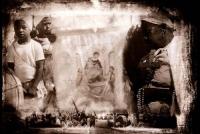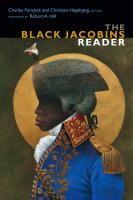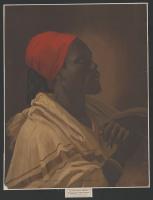 We demand that the Portuguese state, particularly the justice system, recognize the racial motivation behind this assault. We demand that, once and for all, it abandons a "minimalist" legal understanding of racism. We demand that it breaks away from the harmful pattern of denying racism, which endangers the lives of our children, our youth and the democratic life of this country.
We demand that the Portuguese state, particularly the justice system, recognize the racial motivation behind this assault. We demand that, once and for all, it abandons a "minimalist" legal understanding of racism. We demand that it breaks away from the harmful pattern of denying racism, which endangers the lives of our children, our youth and the democratic life of this country.
Mukanda
04.10.2023 | by vários
 Always identified with audacity, - or, as seen in the international press, marked with “controversies” and even “scandals” - the event is among the largest and most important in the art world. The fifteenth edition that was recently carried out was not exempt from a “scandal”: the unanimity of the German press in its judgment of anti-Semitism.
Always identified with audacity, - or, as seen in the international press, marked with “controversies” and even “scandals” - the event is among the largest and most important in the art world. The fifteenth edition that was recently carried out was not exempt from a “scandal”: the unanimity of the German press in its judgment of anti-Semitism.
To read
02.11.2022 | by Cheong Kin Man
 Institutionalized violence shapes who people are—victims and perpetrators alike—to an extent that only the recovery of the condition of plurality can undo it. This points to the most basic right immanent to the human condition, which imperialism constantly compromises: the right not to act against others; in its positive formulation: the right to act alongside and with one another. “Accepting this right in its two forms as fundamental is necessary in order to imagine reparations, so the bliss of being active and repairing what was broken can be attained.
Institutionalized violence shapes who people are—victims and perpetrators alike—to an extent that only the recovery of the condition of plurality can undo it. This points to the most basic right immanent to the human condition, which imperialism constantly compromises: the right not to act against others; in its positive formulation: the right to act alongside and with one another. “Accepting this right in its two forms as fundamental is necessary in order to imagine reparations, so the bliss of being active and repairing what was broken can be attained.
Mukanda
11.08.2022 | by Ariella Aisha Azoulay
 Stuart Hall once wrote that James in The Black Jacobins was the first to centre Atlantic slavery in world history – so in this sense the importance of James’s work to these debates is self-evident. Certainly, James’s short discussion on the economic roots of British parliamentary abolitionism formed the essential outline of Eric Williams’s more famous and lengthy contribution in this field – as Williams himself acknowledged, though in my opinion James’s grasp of the modernity of colonial slavery and the slave ships and plantations thanks to his underlying theoretical grasp of the uneven and combined nature of capitalist development meant his analysis of the exact relationship between capitalism and slavery is more sophisticated than that of Williams in many respects.
Stuart Hall once wrote that James in The Black Jacobins was the first to centre Atlantic slavery in world history – so in this sense the importance of James’s work to these debates is self-evident. Certainly, James’s short discussion on the economic roots of British parliamentary abolitionism formed the essential outline of Eric Williams’s more famous and lengthy contribution in this field – as Williams himself acknowledged, though in my opinion James’s grasp of the modernity of colonial slavery and the slave ships and plantations thanks to his underlying theoretical grasp of the uneven and combined nature of capitalist development meant his analysis of the exact relationship between capitalism and slavery is more sophisticated than that of Williams in many respects.
Face to face
18.11.2020 | by Christian Hogsbjerg, Charles Forsdick and The Public Archive
 In Toussaint Louverture: A Black Jacobin in the Age of Revolutions (Pluto) Charles Forsdick and Christian Høgsbjerg have produced what is arguably the most important biography of Louverture since CLR James’ magisterial Black Jacobins was first published in 1938. Kicking against the contemporary anti-Black and anti-radical revisionism that downplays the historical importance of the revolution while dismissing the significance of Louverture himself, Forsdick and Hogsbjerg’s short monograph is urgent, timely, and strikingly well-written. They have also created a sort of supplement to the book, editing The Black Jacobins Reader (Duke), an excellent collection of essays, commentaries, and primary source material that provides additional context and critique for the writing, production, and circulations of James’ classic history.
In Toussaint Louverture: A Black Jacobin in the Age of Revolutions (Pluto) Charles Forsdick and Christian Høgsbjerg have produced what is arguably the most important biography of Louverture since CLR James’ magisterial Black Jacobins was first published in 1938. Kicking against the contemporary anti-Black and anti-radical revisionism that downplays the historical importance of the revolution while dismissing the significance of Louverture himself, Forsdick and Hogsbjerg’s short monograph is urgent, timely, and strikingly well-written. They have also created a sort of supplement to the book, editing The Black Jacobins Reader (Duke), an excellent collection of essays, commentaries, and primary source material that provides additional context and critique for the writing, production, and circulations of James’ classic history.
Face to face
18.11.2020 | by Charles Forsdick, Christian Hogsbjerg and The Public Archive
 We demand that the Portuguese state, particularly the justice system, recognize the racial motivation behind this assault. We demand that, once and for all, it abandons a "minimalist" legal understanding of racism. We demand that it breaks away from the harmful pattern of denying racism, which endangers the lives of our children, our youth and the democratic life of this country.
We demand that the Portuguese state, particularly the justice system, recognize the racial motivation behind this assault. We demand that, once and for all, it abandons a "minimalist" legal understanding of racism. We demand that it breaks away from the harmful pattern of denying racism, which endangers the lives of our children, our youth and the democratic life of this country.  Always identified with audacity, - or, as seen in the international press, marked with “controversies” and even “scandals” - the event is among the largest and most important in the art world. The fifteenth edition that was recently carried out was not exempt from a “scandal”: the unanimity of the German press in its judgment of anti-Semitism.
Always identified with audacity, - or, as seen in the international press, marked with “controversies” and even “scandals” - the event is among the largest and most important in the art world. The fifteenth edition that was recently carried out was not exempt from a “scandal”: the unanimity of the German press in its judgment of anti-Semitism.  Institutionalized violence shapes who people are—victims and perpetrators alike—to an extent that only the recovery of the condition of plurality can undo it. This points to the most basic right immanent to the human condition, which imperialism constantly compromises: the right not to act against others; in its positive formulation: the right to act alongside and with one another. “Accepting this right in its two forms as fundamental is necessary in order to imagine reparations, so the bliss of being active and repairing what was broken can be attained.
Institutionalized violence shapes who people are—victims and perpetrators alike—to an extent that only the recovery of the condition of plurality can undo it. This points to the most basic right immanent to the human condition, which imperialism constantly compromises: the right not to act against others; in its positive formulation: the right to act alongside and with one another. “Accepting this right in its two forms as fundamental is necessary in order to imagine reparations, so the bliss of being active and repairing what was broken can be attained.  Stuart Hall once wrote that James in The Black Jacobins was the first to centre Atlantic slavery in world history – so in this sense the importance of James’s work to these debates is self-evident. Certainly, James’s short discussion on the economic roots of British parliamentary abolitionism formed the essential outline of Eric Williams’s more famous and lengthy contribution in this field – as Williams himself acknowledged, though in my opinion James’s grasp of the modernity of colonial slavery and the slave ships and plantations thanks to his underlying theoretical grasp of the uneven and combined nature of capitalist development meant his analysis of the exact relationship between capitalism and slavery is more sophisticated than that of Williams in many respects.
Stuart Hall once wrote that James in The Black Jacobins was the first to centre Atlantic slavery in world history – so in this sense the importance of James’s work to these debates is self-evident. Certainly, James’s short discussion on the economic roots of British parliamentary abolitionism formed the essential outline of Eric Williams’s more famous and lengthy contribution in this field – as Williams himself acknowledged, though in my opinion James’s grasp of the modernity of colonial slavery and the slave ships and plantations thanks to his underlying theoretical grasp of the uneven and combined nature of capitalist development meant his analysis of the exact relationship between capitalism and slavery is more sophisticated than that of Williams in many respects.  In Toussaint Louverture: A Black Jacobin in the Age of Revolutions (Pluto) Charles Forsdick and Christian Høgsbjerg have produced what is arguably the most important biography of Louverture since CLR James’ magisterial Black Jacobins was first published in 1938. Kicking against the contemporary anti-Black and anti-radical revisionism that downplays the historical importance of the revolution while dismissing the significance of Louverture himself, Forsdick and Hogsbjerg’s short monograph is urgent, timely, and strikingly well-written. They have also created a sort of supplement to the book, editing The Black Jacobins Reader (Duke), an excellent collection of essays, commentaries, and primary source material that provides additional context and critique for the writing, production, and circulations of James’ classic history.
In Toussaint Louverture: A Black Jacobin in the Age of Revolutions (Pluto) Charles Forsdick and Christian Høgsbjerg have produced what is arguably the most important biography of Louverture since CLR James’ magisterial Black Jacobins was first published in 1938. Kicking against the contemporary anti-Black and anti-radical revisionism that downplays the historical importance of the revolution while dismissing the significance of Louverture himself, Forsdick and Hogsbjerg’s short monograph is urgent, timely, and strikingly well-written. They have also created a sort of supplement to the book, editing The Black Jacobins Reader (Duke), an excellent collection of essays, commentaries, and primary source material that provides additional context and critique for the writing, production, and circulations of James’ classic history. 
